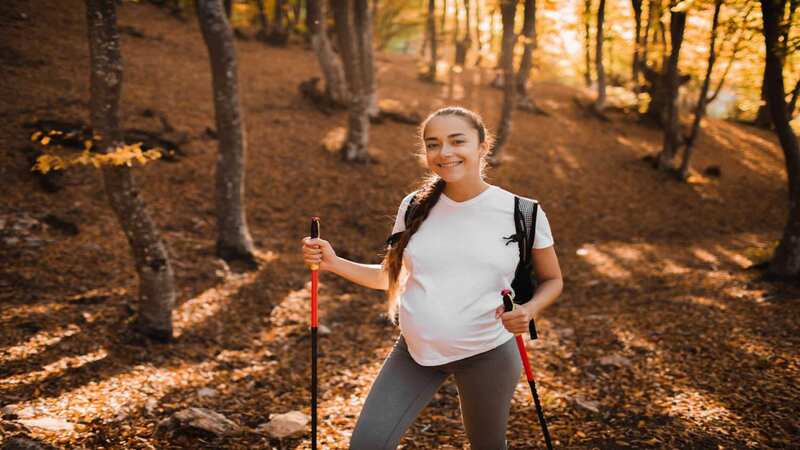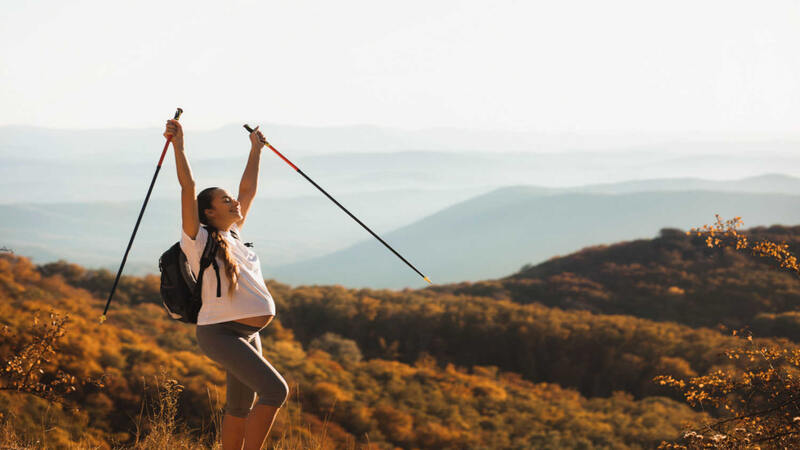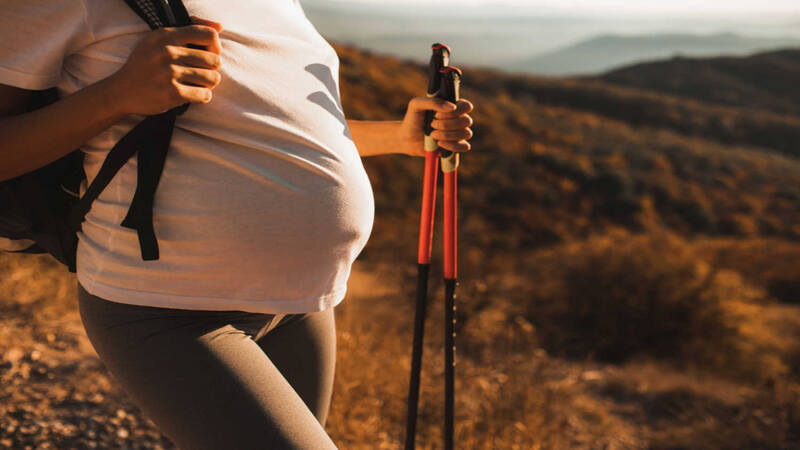
If you are a mountain lover, you would love hiking. Who doesn’t like being close to nature and exploring its wonders? Now that you are pregnant, you may think if hiking is forbidden during pregnancy. But, did you know that you can happily hike by just following a few safety measures even when pregnant? Let’s dive in to know more.
Hiking is a wonderful way to stay active and enjoy the great outdoors. But, is it safe for a pregnant woman? And if so, how can you prepare for it? In this article, we’ll explore the ins and outs of hiking while pregnant, including the benefits, precautions, and frequently asked questions.
Is Hiking Safe During Pregnancy?
The short answer is yes, hiking is generally safe during pregnancy, as long as you take the necessary precautions and listen to your body. Staying active during pregnancy can have numerous benefits for both you and your baby, including improved cardiovascular health, better sleep, and reduced stress and anxiety (1).
However, it’s important to consult with your healthcare provider before starting any exercise program, including hiking. Depending on your health and pregnancy, your provider may recommend modifications or advise against certain activities altogether.
10 Tips For Hiking While Pregnant

Pregnancy often comes with limitations. However, if you’re a hiking enthusiast, you can still lace up your boots and walk through the trails after receiving a green signal from your doctor. Here are a few tips that will ensure your safety and enhance your experience.
1. Start Slow and Rest Frequently
Hiking is about enjoying the journey while ensuring your overall fitness. Start slower than usual and plan your hiking durations. Also, don’t forget to take short breaks in between. Let your body rest and prepare for the further journey.
2. Keep Yourself Hydrated
While hiking through the trails, drink enough water to compensate for the salt losses in sweat. You need more water than usual when you’re pregnant to maintain your and your baby’s health (2). Staying hydrated is required to ensure normal physiological functionality, such as carrying nutrients, forming amniotic fluid, improving digestion, etc.
[Read: Why You Should Use a Pregnancy Belly Belt?]
3. Choose the Right Terrain
As a hiking enthusiast, you might be tempted to walk through your favorite unpaved and challenging trails. However, it’s important to listen to your body and choose wisely. During the first trimester, you may feel tired and dizzy; hence, hiking on a flat and paved trail would be the best choice. You may also carry hiking poles to maintain balance. Once you overcome nausea, you may carry on with your terrain if you’re an expert hiker. Further, choose a trail you’re comfortable with, no matter how experienced you are. After all, your safety comes first.
4. Wear the Right Outfit
Hiking with a proper outfit is a must to ensure comfort. You can wear outfits stitched from moisture-wicking and breathable fabric to regulate temperature. Addedly, you can pair your clothes with supportive footwear so you can hike without worrying about imbalance or slipping. The right outfit and shoes will keep you stable and comfortable.
5. Carry Pee Rags
During pregnancy, it’s common to have a higher urge to urinate; after all, your body is experiencing and coping with the changes. It’s good to prepare in advance and carry pee rags (pee cloth) if you expect frequent bathroom breaks.
6. Bring Along Your Partners
Hiking becomes fun when you walk along with your friends or family members. Ask your friends, family, or partner to join you during the journey. This amplifies the joy and brings peace of mind. You’ll get extra support to take care of you to ensure your safety.
7. Know Your Surroundings
Before planning to hike, keep a check on the surroundings. Know how the weather is, are the conditions favorable or not, etc. Also, carry your medications, first-aid kit, fluids, snacks, and other essentials. It’s better to hike in areas with higher human presence rather than abandoned zones to avoid complications.
8. Don’t Forget to Stretch
Stretching is crucial before stepping on the trails. Prepare your body and mind- stretch your muscles, roll your ankles, and take deep breaths. Also, do a light stretch (cat-cow exercise) after a hike to release tension.
9. Carry a Cell-phone
As pregnancy brings extra caution to care of, let your family know where you’re going and for how long. Bring your phone- install a trail navigation app so you won’t deviate through the route, and turn on your GPS for easy tracking.
10. Don’t Miss Your Regular Check-ups
Whether you’re going to hike or are returning from one, talk to your doctor to check your health status. Visit your doctor regularly to keep a tab on your overall fitness.
Top 5 Benefits of Hiking During Pregnancy

Hiking has its benefits for a pregnant woman. You can just reconnect, unwind, and get lost in the beauty of nature.
Here are the top 5 benefits that a pregnant woman can claim from hiking
1. Improved Cardiovascular Health
Hiking can help strengthen your heart and lungs, making it easier to handle the physical demands of pregnancy and childbirth (3).
2. Reduced Stress and Anxiety
Spending time in nature can have a calming effect on your mind and body, reducing stress and anxiety levels (4).
3. Better Sleep
Regular exercise, such as hiking, can help improve the quality and duration of your sleep, which is especially important during pregnancy (5).
4. Enhanced Mood
The endorphins released during exercise can boost your mood and energy levels, helping you feel happier and more positive (6).
5. Bonding With Baby
Hiking can be a great opportunity to connect with your growing baby and enjoy some quiet time together in nature.
[Read: 6 Ways To Connect With Your Unborn Child]
Precautions to Take While Hiking During Pregnancy

While hiking during pregnancy can be safe and beneficial, there are some precautions you should take to ensure your safety and the safety of your baby
- Avoid hiking in extreme weather conditions, such as high heat or cold temperatures.
- Don’t push yourself too hard or overexert yourself. Listen to your body and take breaks as needed.
- Stay hydrated and well-nourished by bringing plenty of water and healthy snacks.
- Be mindful of your surroundings and avoid potential hazards, such as slippery rocks or steep drop-offs.
If you experience any unusual symptoms, such as vaginal bleeding, abdominal pain, or contractions, stop hiking immediately and seek medical attention. It’s important to listen to your body, take breaks as needed, and avoid pushing yourself too hard. Always consult with your healthcare provider before starting any exercise program during pregnancy.
Hiking during pregnancy can be a safe and enjoyable way to stay active and enjoy the great outdoors. With the right preparation, precautions, and mindset, you can enjoy the benefits of hiking while pregnant and create lasting memories with your growing baby. As always, consult with your healthcare provider and listen to your body to ensure a safe and healthy pregnancy. Happy trails!
[Read Also: How To Identify Braxton-Hick Contractions?]
FAQ’s
1. When Can You Start Hiking During Pregnancy?
You can generally start hiking during pregnancy as long as your healthcare provider gives you the go-ahead. However, it’s important to listen to your body and take things slow, especially in the first trimester when your body is still adjusting to the changes of pregnancy. As your pregnancy progresses, you may need to adjust the intensity and duration of your hikes.
2. Can Too Much Hiking During Pregnancy Cause Any Problems?
Too much hiking during pregnancy can potentially cause problems, especially if you push yourself too hard or fail to take the necessary precautions. Overexertion can lead to dehydration, fatigue, and an increased risk of injury. Additionally, hiking in extreme weather conditions can be dangerous for both you and your baby.
Read Also: Cycling During Pregnancy – Benefits, Risks, and Precautions
References
- Keyes, L. E., Hackett, P. H., & Luks, A. M. (2016). Outdoor Activity and High Altitude Exposure During Pregnancy – https://pubmed.ncbi.nlm.nih.gov/27291703/
- Song Y, Zhang F, Lin G, Wang X, He L, Li Y, Zhai Y, Zhang N, Ma G. A Study of the Fluid Intake, Hydration Status, and Health Effects among Pregnant Women in Their Second Trimester in China: A Cross-Sectional Study. Nutrients. 2023 Apr 2 – https://www.ncbi.nlm.nih.gov/pmc/articles/PMC10096982/#
- Witvrouwen I, Mannaerts D, Van Berendoncks AM, Jacquemyn Y, Van Craenenbroeck EM. The Effect of Exercise Training During Pregnancy to Improve Maternal Vascular Health: Focus on Gestational Hypertensive Disorders. Front Physiol. 2020 May – https://www.ncbi.nlm.nih.gov/pmc/articles/PMC7225346/
- Yusmutia, Annisa & Novrikasari, Novrikasari & Windusari, Yuanita. (2020). Analysis of Physical Activity Against Stress Levels in Pregnant Women at Plaju Health Center – https://www.researchgate.net/publication/342453914
- Alnawwar MA, Alraddadi MI, Algethmi RA, Salem GA, Salem MA, Alharbi AA. The Effect of Physical Activity on Sleep Quality and Sleep Disorder: A Systematic Review – https://www.ncbi.nlm.nih.gov/pmc/articles/PMC10503965/
- Mahindru A, Patil P, Agrawal V. Role of Physical Activity on Mental Health and Well-Being: A Review – https://www.ncbi.nlm.nih.gov/pmc/articles/PMC9902068/

